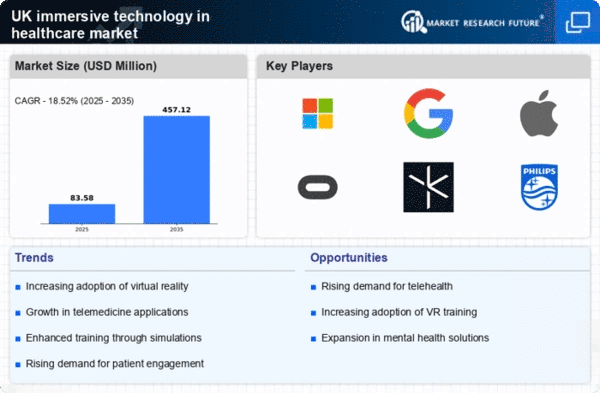Enhanced Data Analytics Capabilities
The integration of advanced data analytics into healthcare is driving the immersive technology-in-healthcare market. As healthcare providers increasingly rely on data to inform clinical decisions, immersive technologies are being utilised to visualise complex data sets in more intuitive ways. For instance, AR can overlay patient data onto real-world environments, aiding clinicians in making informed decisions during procedures. This capability is particularly valuable in the UK, where the healthcare system is under pressure to improve efficiency and outcomes. The immersive technology-in-healthcare market is expected to expand as healthcare organisations recognise the potential of data-driven insights to enhance patient care and operational efficiency.
Increased Focus on Patient-Centric Care
The shift towards patient-centric care is significantly influencing the immersive technology-in-healthcare market. Healthcare providers in the UK are increasingly recognising the importance of involving patients in their treatment processes. Immersive technologies, such as VR and AR, facilitate this by providing interactive experiences that educate patients about their conditions and treatment options. This approach not only enhances patient understanding but also fosters adherence to treatment plans. As a result, healthcare institutions are investing more in immersive solutions, with estimates suggesting that the market could reach £1 billion by 2027. This trend underscores the growing recognition of the value of patient engagement in improving health outcomes.
Technological Advancements in Healthcare
The rapid evolution of technology is a primary driver for the immersive technology-in-healthcare market. Innovations such as virtual reality (VR) and augmented reality (AR) are being integrated into medical training and patient care. For instance, the UK healthcare sector has seen a surge in the adoption of VR simulations for surgical training, which enhances skill acquisition and retention. According to recent data, the immersive technology-in-healthcare market was projected to grow at a CAGR of 30% over the next five years., indicating a robust demand for these technologies. This growth is largely attributed to the increasing need for effective training tools and patient engagement solutions that can improve outcomes and reduce costs.
Regulatory Support and Funding Initiatives
Government initiatives and regulatory support play a crucial role in propelling the immersive technology-in-healthcare market. The UK government has been actively promoting digital health innovations through funding schemes and grants aimed at fostering research and development. For example, the NHS has allocated substantial resources to pilot projects that explore the use of immersive technologies in various healthcare settings. This financial backing not only encourages innovation but also helps mitigate the risks associated with adopting new technologies. As a result, the immersive technology-in-healthcare market is likely to benefit from increased investment, with projections indicating a potential market size of £500 million by 2026.
Growing Demand for Remote Healthcare Solutions
The demand for remote healthcare solutions is a significant driver for the immersive technology-in-healthcare market. With the increasing prevalence of telehealth services, healthcare providers are seeking innovative ways to enhance remote consultations and patient monitoring. Immersive technologies, such as AR, can provide real-time guidance to patients during virtual consultations, improving the quality of care delivered remotely. In the UK, the market for telehealth is expected to grow by 25% annually, which in turn is likely to boost the adoption of immersive technologies. This trend reflects a broader shift towards more flexible and accessible healthcare delivery models, which are essential in meeting the needs of a diverse patient population.















Leave a Comment